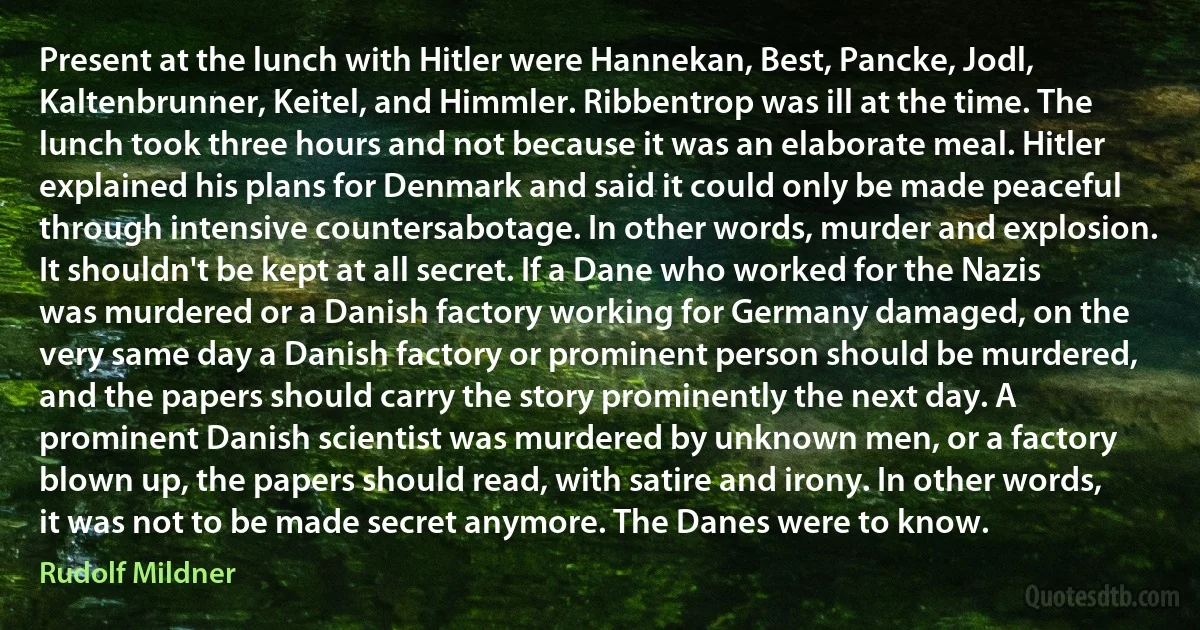
Present at the lunch with Hitler were Hannekan, Best, Pancke, Jodl, Kaltenbrunner, Keitel, and Himmler. Ribbentrop was ill at the time. The lunch took three hours and not because it was an elaborate meal. Hitler explained his plans for Denmark and said it could only be made peaceful through intensive countersabotage. In other words, murder and explosion. It shouldn't be kept at all secret. If a Dane who worked for the Nazis was murdered or a Danish factory working for Germany damaged, on the very same day a Danish factory or prominent person should be murdered, and the papers should carry the story prominently the next day. A prominent Danish scientist was murdered by unknown men, or a factory blown up, the papers should read, with satire and irony. In other words, it was not to be made secret anymore. The Danes were to know.
Rudolf MildnerRelated topics
best blow carry danish day hours ill intensive irony men lunch meal next person present read say secret should story take three time unknown working words Hitler Denmark HimmlerRelated quotes
Every time a Black Freedom Fighter is murdered or captured, the pigs try to create the impression that they have quashed the movement, destroyed our forces, and put down the Black Revolution. The pigs also try to give the impression that five or ten guerrillas are responsible for every revolutionary action carried out in amerika. That is nonsense. That is absurd. Black revolutionaries do not drop from the moon. We are created by our conditions. Shaped by our oppression. We are being manufactured in droves in the ghetto streets, places like attica, san quentin, bedford hills, leavenworth, and sing sing. They are turning out thousands of us. Many jobless Black veterans and welfare mothers are joining our ranks. Brothers and sisters from all walks of life, who are tired of suffering passively, make up the BLA.

Assata Shakur
Can't you feel that the German people has carried for seven years from one station of pain to another a huge cross? Can't you feel that it is persecuted, hounded and whipped bloody like the Nazarene? If you cannot feel that it is gasping under the weight of the cross which was burdened on it and that it walks on its way to Golgatha -- then you're not worth that God the Lord will again let the sun of his mercy shine upon you. ...
Help us so that in this decisive hour the German people will be freed from the weight of the cross of the yoke of Jewry! Help us, so that a mighty man who's been gifted by God can give us back our freedom and that it will again be a proud people in a German country! Take care that Germany is freed from the chains she has been bound with for seven years. Put an end to this slavery! Our people shall again be great, proud and beautiful!

Julius Streicher
It had been the winter of 1835-6 that the ship, Alert, in her voyage for hides on the remote and almost unknown coast of California, floated into the vast solitude of the bay of San Francisco. All around was the stillness of nature. One vessel, a Russian, lay at anchor there, but during our whole stay not a sail came or went. Our trade was with remote missions, which sent hides to us in launches manned by their Indians... Over a region far beyond our sight there was no other human habitations, expect that an enterprising Yankee, years in advance of his time, had put up, on the rising ground above the landing, a shanty of rough boards, where he carried on a very small retail trade between the hide ships and the Indians. On the evening of Saturday, the thirteenth of August, 1859 (I again sailed into) the entrance to San Francisco, (now) the great center of worldwide commerce.

Richard Henry Dana, Jr.
What is the good, I ask, in the name of common sense, of prohibiting sweating in this country if you allow sweated goods to come in from foreign countries? If you insist on limitation, of hours and upon precautions for security, bear in mind all these things add to the cost of production, to the difficulties of the manufacturer in selling his goods, and unless you give him some increased price, some increased advantage in compensation, then he cannot carry on competition any longer. All these conditions in the long run will result not to your advantage, for you will have no work to do, but to the advantage of the foreigner, who is not so scrupulous and who conducts his work without any of these conditions...If protected labour is good, and I think in many ways it is...then it is good to protect the results of labour, and you cannot do one without the other.

Joseph Chamberlain
For what advantage is it, that the world enjoys profound peace, if thou art at war with thyself? This then is the peace we should keep. If we have it, nothing from without will be able to harm us. And to this end the public peace contributes no little: whence it is said, ‘That we may lead a quiet and peaceable life.' But if any one is disturbed when there is quiet, he is a miserable creature. Seest thou that He speaks of this peace which I call the third (inner, ed.) kind? Therefore when he has said, ‘that we may lead a quiet and peaceable life,' he does not stop there, but adds ‘in all godliness and honesty.' But we cannot live in godliness and honesty, unless that peace be established. For when curious reasonings disturb our faith, what peace is there? or when spirits of uncleanness, what peace is there?

John Chrysostom
